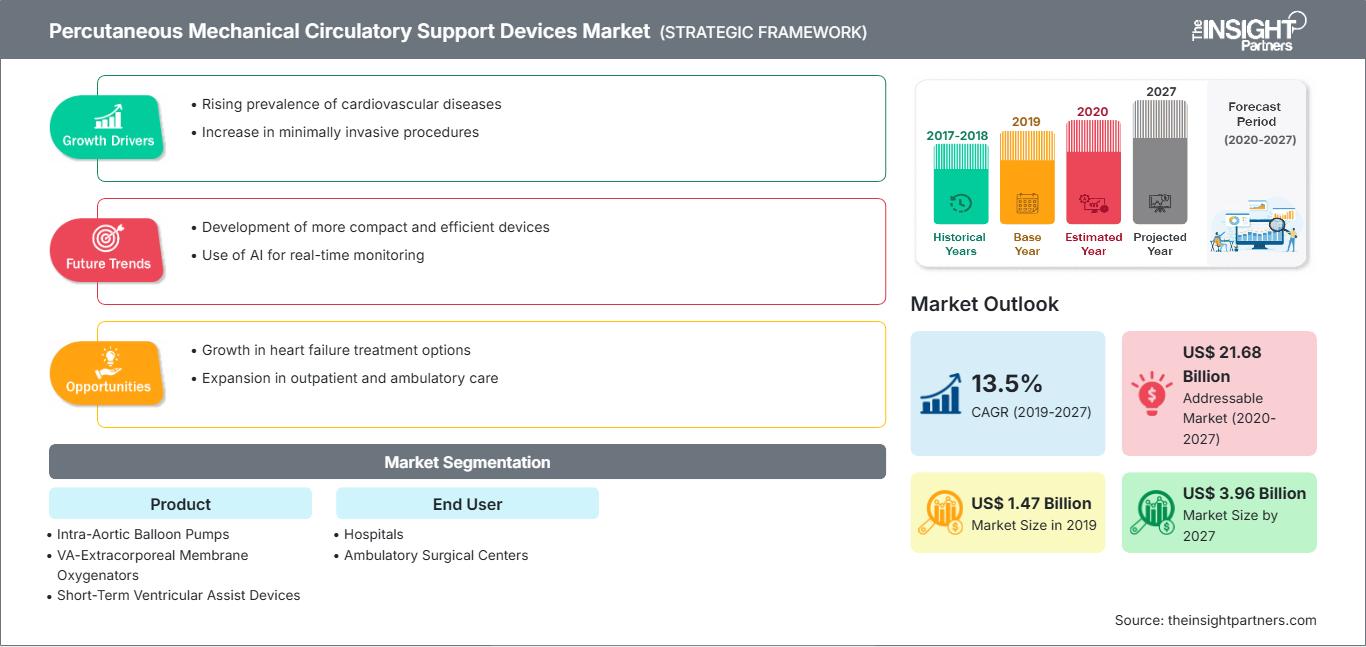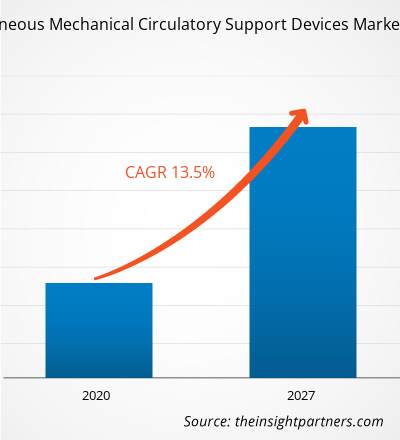The percutaneous mechanical circulatory support devices market was valued at US$ 1,474.28 million in 2019 and is projected to reach US$ 3,964.75 million by 2027; it is expected to grow a ta CAGR of 13.5% during 2020–2027.
Percutaneous mechanical circulatory support devices offers an effective and rapid approach to slow the downward spiral of hemodynamic instability among patients suffering with decompensated heart failures and cardiogenic shocks till a more definitive strategy is perceived among patients to recover from these cardiac ailments. The major roles of the percutaneous mechanical circulatory support devices includeimproving the native cardiac output, reducing ventricular volume and filling pressures, augmenting coronary perfusion, and maintaining vital organ perfusion.
Market Insights
Rising Geriatric Population
The high market growth is anticipated on account of the rising global geriatric population. In both male and female population, the risk of cardiovascular diseases increases with an increase in age. Aging blood vessels are less flexible,leading to reducedblood flow. Thus, the risk of heart disease is high in the elderly population. Also, according to the Heart Disease and Stroke Statistics 2018, the average age at the first heart attack is 65.6 years for males and 72.0 years for females. It also mentioned that the annual incidence of a heart attack in the US is 720,000 new attacks and 335,000 recurrent attacks. Moreover, according to the National Institutes of Health (NIH), America’s 65-and-over population is projected to nearly double over the next three decades, from 48 million to 88 million by 2050. Cardiovascular disease (CVD) in older Americans imposes a huge burden in terms of mortality, morbidity, disability, functional decline, and healthcare costs. A retrospective study performed by the University of Pittsburgh in 2015 states that the prevalence of CVD, including hypertension, CHD, HF, and stroke, increases from about 40% in men and women 40–59 years and 70-75% in persons aged 60–79 years, and 79–86% among those aged 80 years or older. Thus, the growing geriatric population leading to higher risks of heart failures and cardiogenic shocks increases the applications of percutaneous mechanical circulatory support devices and eventually favors market growth.Customize This Report To Suit Your Requirement
You will get customization on any report - free of charge - including parts of this report, or country-level analysis, Excel Data pack, as well as avail great offers and discounts for start-ups & universities
Percutaneous Mechanical Circulatory Support Devices Market: Strategic Insights

-
Get Top Key Market Trends of this report.This FREE sample will include data analysis, ranging from market trends to estimates and forecasts.
Product-Based Market Insights
The product segment of the percutaneous mechanical circulatory support devices market is segmented into intra-aortic balloon pumps, VA-extracorporeal membrane oxygenation, and short-term ventricular assist devices. The intra-aortic balloon pumps segment held the largest share of the percutaneous mechanical circulatory support devices market in 2019. The short-term ventricular assist devices segment is anticipated to grow at aCAGR of 14.0% during the forecast period.
EndUser-Based MarketInsights
The end user segment of the percutaneous mechanical circulatory support devices market is segmented hospitals, ambulatory surgical centers, and others. The hospitals segment heldthe largest shareof the percutaneous mechanical circulatory support devices market in 2019. The segment is also anticipated to grow at a CAGR of 14.2% during the forecast period.
Product launchesand product approvalstrategiesarecommonly adopted by companies to expand their footprintsand product portfolio worldwide and meet the growing demand.
Additionally, the market players operating in the percutaneous mechanical circulatory support devices marketadopt the strategy ofexpansion to enlarge customer base across the world, which permits the players to maintain their brand name globally. For instance, in June 2016, Medetronic launched a product—Beacon, a care management service for high-risk heart failure patients. This service combines data from Medtronic implantable cardioverter defibrillator (ICD) or cardiac resynchronization therapy (CRT) devices with post-acute monitoring from MCMS.
Percutaneous Mechanical Circulatory Support Devices Market Regional InsightsThe regional trends and factors influencing the Percutaneous Mechanical Circulatory Support Devices Market throughout the forecast period have been thoroughly explained by the analysts at The Insight Partners. This section also discusses Percutaneous Mechanical Circulatory Support Devices Market segments and geography across North America, Europe, Asia Pacific, Middle East and Africa, and South and Central America.
Percutaneous Mechanical Circulatory Support Devices Market Report Scope
| Report Attribute | Details |
|---|---|
| Market size in 2019 | US$ 1.47 Billion |
| Market Size by 2027 | US$ 3.96 Billion |
| Global CAGR (2019 - 2027) | 13.5% |
| Historical Data | 2017-2018 |
| Forecast period | 2020-2027 |
| Segments Covered |
By Product
|
| Regions and Countries Covered |
North America
|
| Market leaders and key company profiles |
|
Percutaneous Mechanical Circulatory Support Devices Market Players Density: Understanding Its Impact on Business Dynamics
The Percutaneous Mechanical Circulatory Support Devices Market is growing rapidly, driven by increasing end-user demand due to factors such as evolving consumer preferences, technological advancements, and greater awareness of the product's benefits. As demand rises, businesses are expanding their offerings, innovating to meet consumer needs, and capitalizing on emerging trends, which further fuels market growth.

- Get the Percutaneous Mechanical Circulatory Support Devices Market top key players overview
Global Percutaneous Mechanical Circulatory Support Devices Market – ByProduct
- Intra-Aortic Balloon Pumps
- VA-Extracorporeal Membrane Oxygenation (ECMO)
- Oxygenators
- Short-Term Ventricular Assist Devices (VADs)
- Impella
- Tandem Heart
Global Percutaneous Mechanical Circulatory Support DevicesMarket – By EndUser
- Hospitals
- Ambulatory Surgical Centers
- Others
Global Percutaneous Mechanical Circulatory Support Devices– By Geography
-
North America
- US
- Canada
- Mexico
-
Europe
- France
- Germany
- Italy
- UK
- Spain
- Rest of Europe
-
Asia Pacific (APAC)
- China
- India
- South Korea
- Japan
- Australia
- Rest of APAC
-
Middle East &Africa (MEA)
- South Africa
- Saudi Arabia
- UAE
- Rest of MEA
-
South America (SAM)
- Brazil
- Argentina
- Rest of SAM
Company Profiles
- Abbott.
- Medtronic
- Getinge AB
- Teleflex Incorporated
- LivanovaPlc (Cardiacassist, Inc.).
- Abiomed
- Eurosets
- Berlin Heart
- Jarvik Heart, Inc.
- CardioBridge GmbH
Frequently Asked Questions
What is the regional analysis in terms of percutaneous mechanical circulatory support devices?
What are the driving factors for percutaneous mechanical circulatory support devicesmarketacross the globe?
What arepercutaneous mechanical circulatory support devices?
- Historical Analysis (2 Years), Base Year, Forecast (7 Years) with CAGR
- PEST and SWOT Analysis
- Market Size Value / Volume - Global, Regional, Country
- Industry and Competitive Landscape
- Excel Dataset
Recent Reports
Testimonials
Reason to Buy
- Informed Decision-Making
- Understanding Market Dynamics
- Competitive Analysis
- Identifying Emerging Markets
- Customer Insights
- Market Forecasts
- Risk Mitigation
- Boosting Operational Efficiency
- Strategic Planning
- Investment Justification
- Tracking Industry Innovations
- Aligning with Regulatory Trends





















 Get Free Sample For
Get Free Sample For